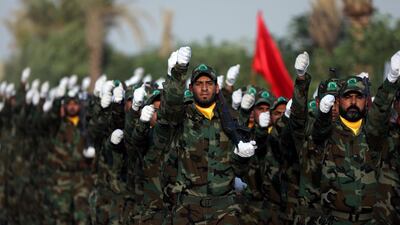It is early days yet, but there seems to be determination on the part of Saudi Arabia and Iran to tackle contentious issues between them in a bilateral manner. Both countries' desire for continued engagement, after the initial talks were hosted by Iraq – as confirmed by President Barham Salih – suggests that de-escalation of tensions and confidence-building measures could be the way forward.
Saudi Arabia and Syria are reportedly talking to each other, too. And although their outreach is independent of the Saudi-Iranian talks, it is natural that one could influence the other. Russia is supposedly playing a role in the Syria talks as Moscow seeks that country's restoration to the Arab League. This is in order for Damascus to attract Arab and international financing for the post-war reconstruction of Syria, while ensuring that Russian interests in the country are maintained.
Another sign that the countries of the Middle East are trying to resolve their differences and conflicts is the gradual improvement in relations between Egypt and Turkey.
Of course, it is too early to say if the region is starting a new chapter in its history. It is also naive for us to believe that the global powers are not involved in these developments. But it isn’t wrong to suggest that a reduced trust in and among some of these powers – notably the US, China and Russia – has contributed to regional players seeking rapprochement with one another.
The Saudi-Iranian talks, in particular, seem to have been triggered by a shared conviction that the US is difficult to rely on.
For the Saudis, the previous Trump administration’s support proved inadequate when its Aramco facility came under attack from the Iranian-backed Houthi rebels in neighbouring Yemen. Then, the current Biden administration failed to draw any of the Gulf states into future nuclear talks with Iran, as Washington insisted on separating the issue of Tehran’s nuclear weapons programme from that of its ballistic missiles programme and expansionist behaviour inside weaker Arab countries.
From the Iranian standpoint, trust in the US eroded considerably after former president Donald Trump withdrew his country from the nuclear deal, originally signed in 2015. America’s commitment to any deal it signs in the future is now being questioned and Tehran fears the JCPOA – as it is called – could be repealed again by a future administration, despite President Joe Biden’s stated intention to rejoin it.
Yet none of this means that the differences between the Kingdom and Islamic Republic are not vast. US presence in the region is a contentious issue for Tehran – as much as the Iranian regime’s ideology and proxy wars in the region are for the Arab states. This explains why these talks are supposedly taking place primarily through security channels.
The ongoing civil war in Yemen is the most pressing issue, as that country shares a long border with Saudi Arabia and has a strong presence of Iranian-backed proxy forces threatening Riyadh’s security. The talks are also focusing on bilateral relations, the nuclear deal and the future of Iraq.

There seems to be an understanding between the two countries that Iraq and its security should be immunised from regional differences and that the country should be supported in order for it to play a positive role in the region. That is a positive step.
In a recent conversation, President Salih told me that Iraqi sovereignty is indeed an issue. His vision is for Iraq to become “a sovereign, stable, prosperous country that is a bridge between the various actors in this neighbourhood”, he added. “Iraq should decide the Iraqi issues, Iraqi sovereign issues like the military presence of any foreign country. [This] should be decided by the Iraqi government, by the Commander-in-Chief based on the requirements of Iraq.”
While reiterating that “both the Iraqi side and the United States do not want to see permanent presence of American troops here in Iraq”, Mr Salih also stressed on the importance of maintaining cordial relations with Iran, which is insecure of American security presence in the country. “We seek good relations with Iran. Iran is a vital and important neighbour of ours,” he said, pointing to Iranian support for its fight against ISIS in previous years.
Iraq is not the only country struggling to maintain its independence from Iran. The future of Lebanon is in question, too, with Hezbollah being a particular source of contention. Saudi Arabia has designated Hezbollah as a terror group and sees its role as subversive not only in Lebanon but in Syria and Yemen as well. But the group is integral to Iran’s proxy wars. This possibly explains why Lebanon's future has not been given as much priority by either country in their recent talks.
In truth, Lebanon has inflicted its own isolation upon itself, excluding itself from inter-Arab or Arab-Iranian negotiations in the process. In Iran’s view, Lebanon is just an annex, and in the Arab view, it is perhaps a hopeless case.
Its future, however, can be tied in with that of Syria, at least to some extent. If the Assad regime does manage to return to the Arab League, it should be facilitated in exchange for its respect for Lebanon’s sovereignty. It should refrain from using the border between the two countries to smuggle and loot at the expense of innocent Lebanese. Syria must pledge not to seek to restore its dominance over it.
All in all, it is remarkable that key Arab states are moving forward to shape their own destinies, and to seek the play a mediating role, whether it is with Iran or with Turkey. Time will tell if they succeed.
Raghida Dergham is the founder and executive chairwoman of the Beirut Institute and a columnist for The National


